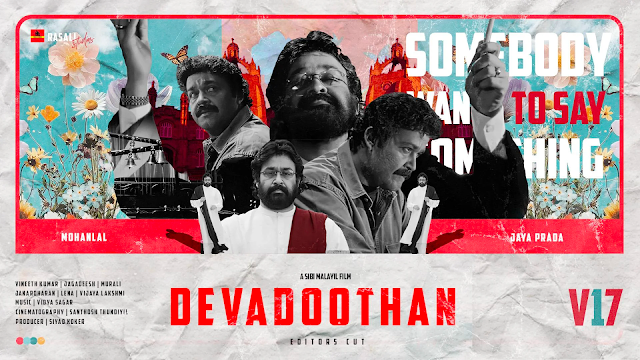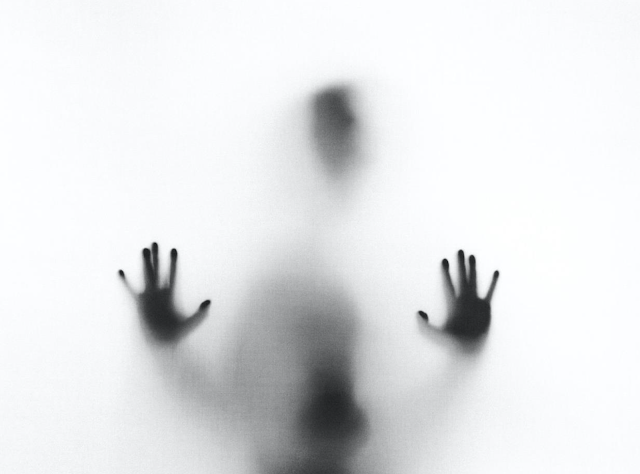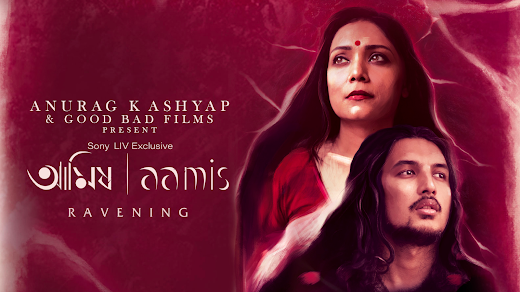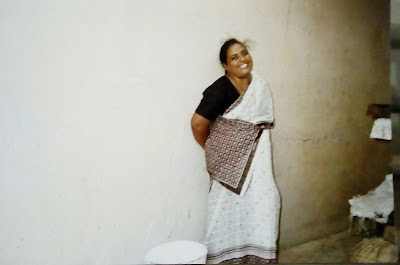'Devadoothan' - A Musical Horror Flick
Recently, I revisited the Malayalam film "Devadoothan," a captivating cinematic masterpiece that cannot be put into a single genre. Directed by Sibi Malayil, the film took an astonishing 17 years to be on the big screen. Interestingly, it was meant to be Malayil's debut dream project, but fate intervened, causing delays. Surprisingly, despite its potential, "Devadoothan" failed to make an impact at the box office upon its initial release in the year 2000. Renowned for its unique storyline and hauntingly beautiful music, "Devadoothan" takes audiences on a mystical journey that seamlessly blends fantasy, drama, and romance elements. With outstanding performances, mesmerizing visuals, and a thought-provoking narrative, "Devadoothan" stands the test of time as a timeless classic in Malayalam cinema.
 |
| Source: Malayalam Movie Reddit |
The film's very title, "Devadoothan," carries a certain divine enchantment. It was helmed by the renowned director Sibi Malayil, with a script penned by Raghunath Paleri. Starring Mohanlal and Jaya Prada in lead roles, "Devadoothan" falls under the category of musical mystery-horror, while it also showcases psychological thriller elements and possesses all the ingredients of a classical blockbuster. Yet, for reasons unknown, it failed to resonate with audiences at the time. Today, as we celebrate over two decades since its release, let me explain why "Devadoothan" remains an underrated masterpiece.
The plot of "Devadoothan" is truly unique, and each character is crafted with exceptional depth. The main character, Vishal Krishnamoorthy, portrayed by Mohanlal, possesses a meticulously constructed backstory that tugs at your heartstrings. The movie takes us on a journey through Vishal's past, a gifted musician whose life came to a standstill when he was expelled from college.
Years later, he receives a call to direct a musical play at the same college, and during his entry sequence, Vishal addresses a supernatural presence that summoned him there. This sets the tone for the movie's tagline, "Someone has something to say to someone." Throughout the film, several instances indicate this supernatural presence, such as the discovery of the name "Maheshwar" in an old verse, the piano playing by itself, and the changing course of the play, dialogue, and character Mary to Aleena through Vishal's introspection.
The film's music, composed by Vidyasagar, accompanied by the lyrical prowess of Kaithapram Damodaran Namboothiri, adds another layer of enchantment. The fusion of Western-style composition with the traditional Tyagaraja song "Entharo Mahanu" possesses an indescribable magic. Other tracks, such as "Karale Nin" and "En Jeevane," are equally masterful. One can only imagine the captivating experience of hearing these songs in a theater setting. I must admit, the theme song gave me the creeps the first time I heard it, and it still does. What a beautiful eerie melody!
 |
| Listen to the Cover version of the Theme Song |
In an interview, Vidyasagar mentioned the significance of the seven bells instrument, treating it as a living entity. The instrument not only had bells but also the keys of a piano and the bellows and stops of a harmonium. It creates the sound of wind while playing, and it becomes evident that Vishal is the one who can bring it back to life. The instrument remained silent after Vishal's expulsion until he returned for the play, signifying his connection to it. The film beautifully portrays why Maheshwar is drawn to Vishal – their shared interest and love for music.
Mohanlal's portrayal of Vishal Krishnamoorthy, a renowned musician, adds yet another iconic role to his repertoire. Equally brilliant is Jaya Prada's portrayal of Aleena, a character brought to life through Raghunath Paleri's exceptional writing. As for Jaya Prada, the actress delivers an extraordinary performance, captivating viewers, particularly during the climax.
Notably, the song "Karale Nin" is recurrent throughout the film, enhancing its emotional impact. In a poignant scene, Jaya Prada's character senses the spiritual presence of Maheshwar, her deceased love interest, accompanied by the haunting melody of "Aleena." Director Sibi Malayil crafts this scene flawlessly, evoking a profound sense of heartbreak in viewers. The cinematography, skillfully executed by Santhosh Thundiyil, imbues every frame with a richness and style rarely seen in Malayalam cinema at that time. In fact, the frames in Devathoothan were ahead of its times.
 |
| Source: Pinterest |
Coming back to the plot, Maheshwar attempts to communicate through various means. The instrument plays on its own because Alberto, William's horseman, slashed Maheshwar's fingers on Seven Bells while he was playing it. People experience the terror of being chased by barking dogs because that was the only sound Maheshwar could hear, being blind. Maheshwar never intended to harm Aleena; his only desire was to let her know that he never intentionally left her and wanted to return if he could.
Even when Maheshwar and Aleena leave for their afterlife, he leaves Vishal with a musical composition for his masterpiece, the same music played at the beginning of the movie titled "Rhythm of Love." Just as Vishal helps Maheshwar express his agony to the love of his life, Maheshwar helps Vishal rediscover his passion for music, transforming him into an award-winning music composer.
One of the downsides of the movie was the unnecessary stunts and comedy sequences that didn't quite hit the mark. The slapstick humor in many instances in the film was often cringeworthy, although this was a prevalent trend in many movies during that time, partially due to the audience's preferences. It seemed like directors included these elements just to appease the viewers, but fortunately, they didn't disrupt the overall flow of the movie or significantly impact its quality.
"Devadoothan" is a testament to visionary filmmaking transcending expectations, particularly within the Malayalam industry. It took a couple of years for "Devadoothan" to find its rightful audience, and today, people regard it as a one-of-a-kind gem in Malayalam cinema. In summary, "Devadoothan" intricately weaves a tale of a supernatural presence, music, and love. Through Vishal's journey, the film explores the power of music to bridge the gap between worlds and rediscover one's true calling. The instances of the instrument, the haunting sounds, and Maheshwar's pursuit of communicating his feelings create a captivating storyline that keeps viewers engaged until the end.










nice... this is one of my favorite movie.
ReplyDelete